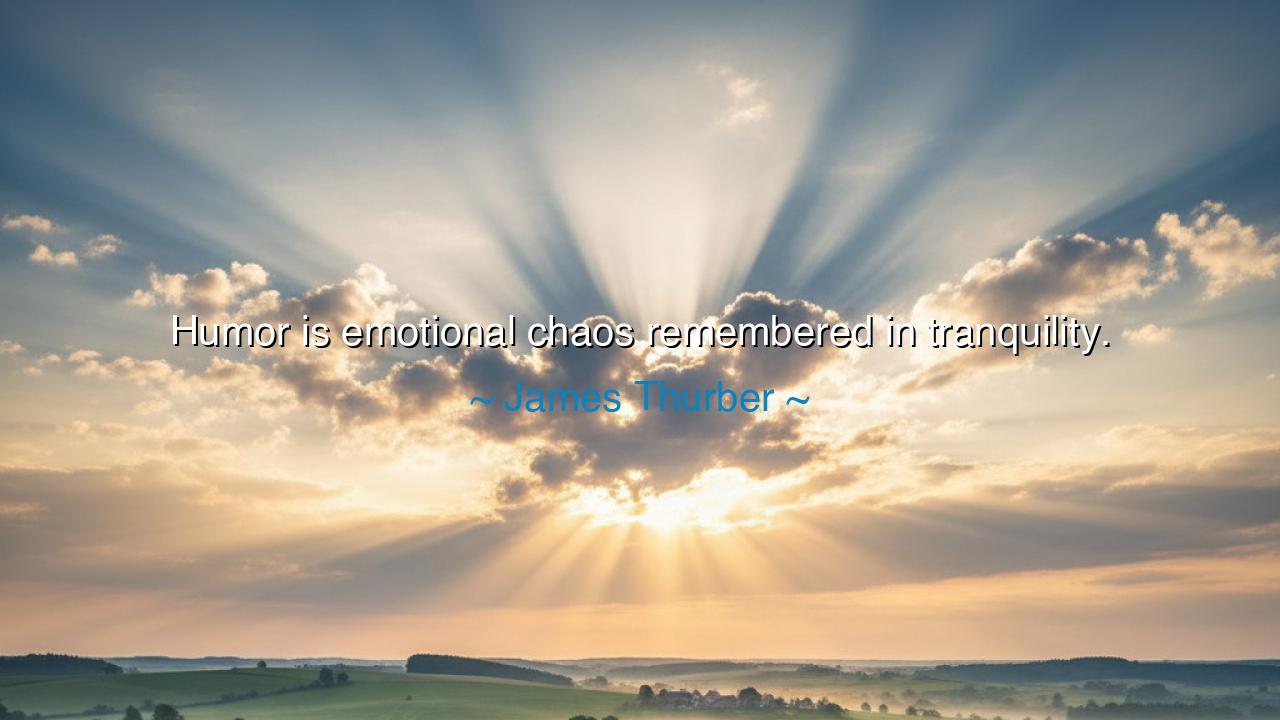
Humor is emotional chaos remembered in tranquility.






In the quiet wisdom of reflection, when the storm of life has passed and only memory remains, James Thurber, the great humorist and observer of human folly, gave us this enduring truth: “Humor is emotional chaos remembered in tranquility.” These words, though gentle in sound, hold the weight of understanding that comes only through experience — the recognition that laughter is born not in comfort, but in struggle; that it is the mind’s serene recollection of moments once filled with turmoil and confusion. In this quote lies the paradox of the human spirit — that from pain can come joy, from disorder can rise meaning, and from chaos can emerge laughter that redeems the heart.
Thurber, who lived through both personal and collective storms — the blindness that shadowed his later life, the Great Depression, the wars that scarred his generation — knew deeply the art of finding peace within absurdity. His humor was not the shallow jest of one untouched by life’s difficulties, but the refined laughter of one who had survived them. He saw that the human condition is, by nature, chaotic — filled with mistakes, misunderstandings, heartbreaks, and ironies — and yet, when the heart grows calm enough to look back, it can smile. That smile is not denial; it is acceptance. It is the mind’s way of saying, “I have endured this, and now I see its pattern.”
To call humor “emotional chaos remembered in tranquility” is to acknowledge that all true laughter has its roots in suffering. When we trip and fall, when love fails us, when plans unravel — in those moments, we feel only confusion and pain. But time, the great healer, transforms these moments into stories. The sting fades, and what remains is perspective — a gentle distance that allows us to laugh where once we cried. Thus, humor is not mockery, but wisdom; it is the soul’s quiet triumph over its own past. The ancients might have called it the laughter of the philosopher, the ability to look upon the folly of life without bitterness.
Consider the life of Charles Chaplin, the great silent comedian. Behind his laughter was the memory of hunger and hardship, of growing up fatherless and poor in the streets of London. Yet from that chaos, he created beauty — turning pain into art, despair into laughter. His comedy was not cruel but compassionate, for he understood that all of humanity is caught in the same dance of misfortune. Chaplin’s humor, like Thurber’s, was born from suffering transformed by time — the laughter that arises only after one has made peace with what once seemed unbearable.
Humor, then, is a form of healing. It is memory purified by distance — the fire of emotion cooled into light. It allows us to hold our past not as a wound, but as a story worth telling. The one who laughs at their own mistakes is no longer their prisoner. They have risen above the chaos, and by remembering it in tranquility, they have turned pain into power. To laugh wisely is to forgive — both oneself and the world — for being imperfect. In this way, humor is not only art but salvation.
The philosophers of old understood this truth in their own tongue. Marcus Aurelius, the Stoic emperor, spoke of detachment, of viewing one’s troubles from a calm and distant height. Thurber’s humor, though clothed in jest, carries the same spirit: that tranquility transforms turmoil. The wise man does not drown in emotion; he remembers it with grace. And that memory, softened by time and understanding, becomes laughter — the purest sign that the soul has survived its trial and learned its lesson.
So, dear reader, let this teaching take root in your heart: when life overwhelms you with chaos, do not despair. Live through it. Endure it. For the day will come when the tempest will fade, and what now feels unbearable will become the material of wisdom — and perhaps even laughter. Keep faith in the transforming power of time, and cultivate serenity within yourself. When you can look back upon your troubles and smile, you will have conquered them.
For as James Thurber teaches, humor is not born in ease but in endurance. It is the calm after the storm, the soul’s quiet declaration that it has weathered the chaos and found peace. Learn to laugh not to escape life, but to understand it. In that laughter lies freedom — the freedom of one who has lived, remembered, and finally, forgiven.






AAdministratorAdministrator
Welcome, honored guests. Please leave a comment, we will respond soon